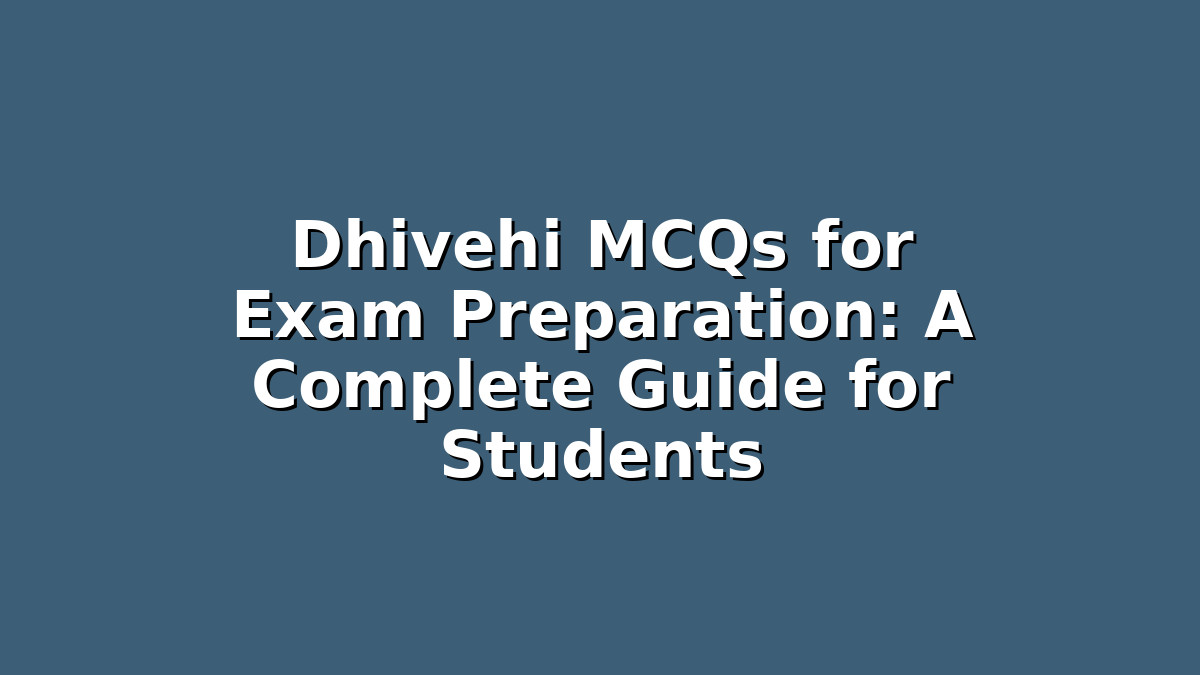Preparing for exams can be challenging, especially when it comes to mastering subjects like Dhivehi, the official language of the Maldives. Whether you’re a high school student or preparing for competitive exams that include Dhivehi language sections, using Multiple Choice Questions (MCQs) as a study tool can significantly boost your understanding and confidence. This article will guide you through effective strategies for using Dhivehi MCQs for exam preparation, helping you sharpen your skills and achieve better results.
Why Use Dhivehi MCQs for Exam Preparation?
MCQs are one of the most popular question formats in exams because they test your knowledge efficiently and objectively. For language subjects, MCQs help in assessing grammar, vocabulary, sentence structure, and comprehension skills. When preparing for Dhivehi exams, practicing MCQs allows you to:
– Identify your strengths and weaknesses quickly.
– Get familiar with the exam pattern and question style.
– Improve your speed and accuracy in answering questions.
– Retain language rules and vocabulary through repeated exposure.
With the right approach, Dhivehi MCQs can become your best friend during exam preparation. Let’s explore how you can effectively prepare using these questions.
—
1. Master the Basics of Dhivehi Grammar and Vocabulary
Before diving into MCQs, ensure your foundation in Dhivehi grammar and vocabulary is solid. MCQs often test your understanding of sentence structure, verb conjugations, tenses, and common vocabulary, so it’s crucial to have a strong grasp of the basics.
Tips for mastering Dhivehi grammar and vocabulary:
– Create concise notes: Summarize important grammar rules, such as verb forms, pluralization, and sentence formation, into easy-to-review notes.
– Use flashcards: Flashcards with Dhivehi words on one side and meanings or synonyms on the other help in memorizing vocabulary efficiently.
– Read Dhivehi texts: Reading newspapers, poetry, or short stories in Dhivehi will expose you to practical language use and new words.
– Practice writing: Write short essays or paragraphs in Dhivehi to reinforce grammar and vocabulary usage.
Once you feel comfortable with the basics, practicing MCQs will be more effective because you’ll understand the rationale behind each answer choice rather than guessing blindly.
—
2. Practice Dhivehi MCQs Regularly and Review Your Mistakes
Consistent practice is key to excelling at Dhivehi MCQs. Set aside dedicated study sessions to work through practice questions, either from textbooks, online resources, or past exam papers.
How to practice effectively:
– Simulate exam conditions: Time yourself and avoid distractions while solving MCQs to improve your focus and time management.
– Vary question sources: Use multiple resources to get exposure to different question styles and difficulty levels. This broadens your understanding and prepares you for anything the exam might throw at you.
– Analyze every question: Don’t just mark whether you got a question right or wrong. Take the time to understand why a particular answer is correct and why others are wrong.
– Keep an error log: Maintain a notebook or digital document where you write down questions you struggled with. Regularly revisit this log to ensure you don’t repeat mistakes.
Regular practice builds confidence and helps you identify patterns in questions, enabling you to anticipate types of questions and common traps.
—
3. Use Active Learning Techniques to Enhance Retention
Simply answering MCQs passively won’t maximize your exam preparation. Incorporate active learning strategies to deepen your understanding and improve long-term retention of Dhivehi language concepts.
Active learning techniques include:
– Teach what you learn: Explain grammar rules or vocabulary to a peer or even to yourself aloud. Teaching helps clarify your own understanding and reveals gaps.
– Create your own MCQs: Writing your own multiple choice questions based on your study material forces you to think critically about key concepts.
– Group study sessions: Collaborate with classmates to discuss difficult questions and share insights. Group discussions often uncover new perspectives and explanations.
– Use multimedia resources: Supplement your studies with Dhivehi language videos, audio recordings, and apps that offer interactive MCQ quizzes.
By actively engaging with the material, you’ll develop a more comprehensive grasp of the Dhivehi language, making it easier to recall information during exams.
—
Conclusion
Preparing for Dhivehi exams using MCQs is an effective and efficient way to boost your language skills and exam confidence. Start by strengthening your foundation in grammar and vocabulary, practice MCQs regularly while focusing on understanding mistakes, and engage in active learning techniques to enhance retention. Remember, consistent effort and a positive mindset are key to exam success. Stay motivated, utilize the resources available, and you’ll find yourself better prepared and more confident to tackle your Dhivehi exams.
Good luck with your studies, and keep practicing those Dhivehi MCQs!

Responses